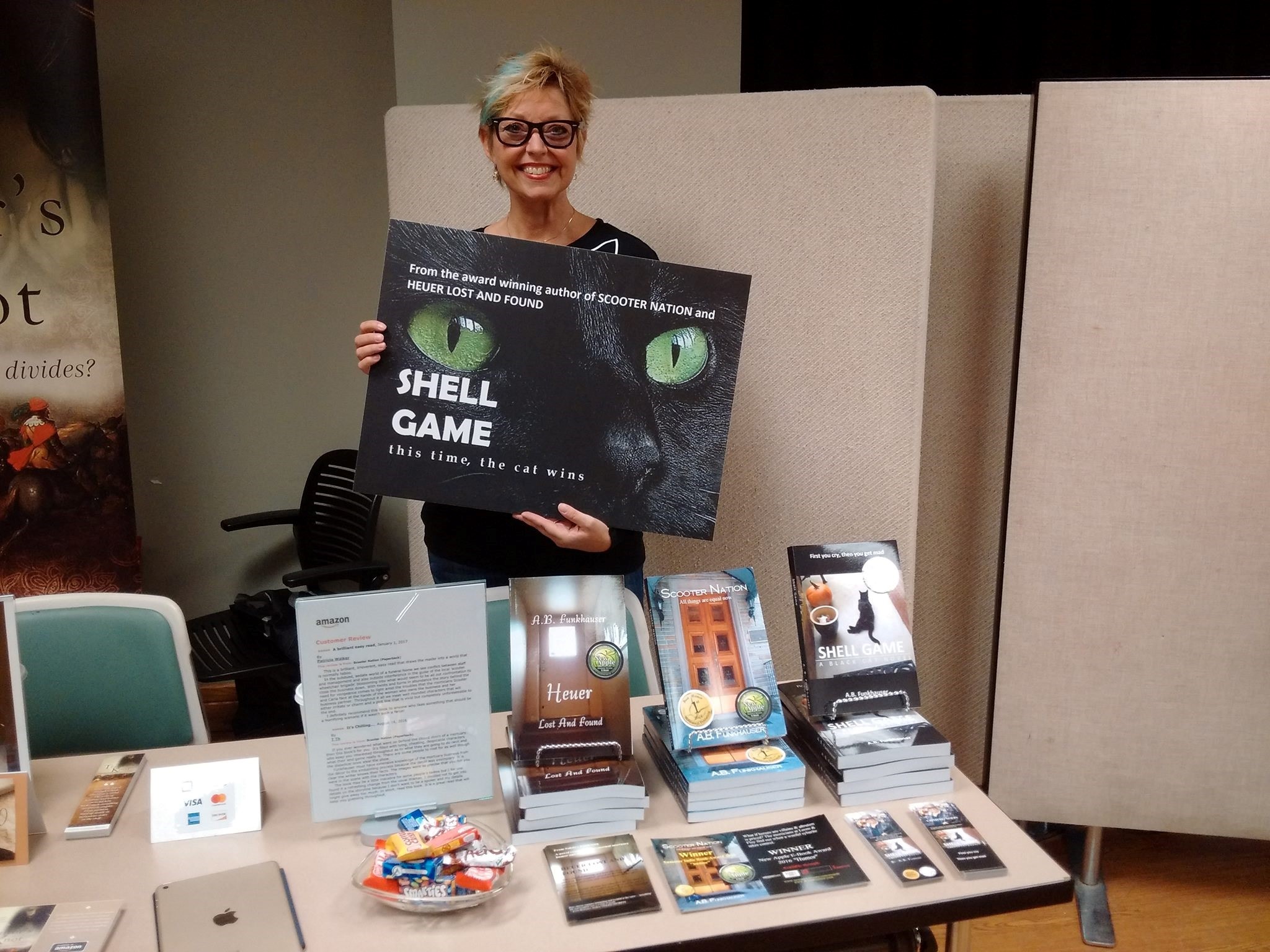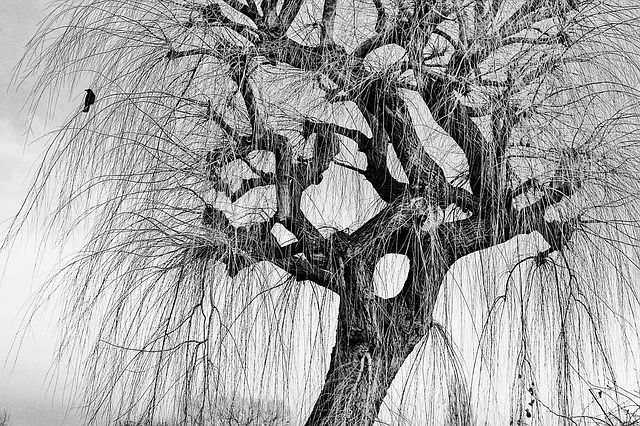Gwynn Scheltema
My Access Copyright notification came the other day to say that the Writers and Artists Payback Claim period for 1997 to 2016 opened on April 1 (closing date is May 31). I’ve also received several updates about the ongoing battle for creator rights in our Canadian Courts and what we as writers can do to help. The Writers’ Union of Canada (TWUC) also sent an update on the court cases and the advocacy they are doing.
I’ve watched my Access Copyright cheque shrink drastically over the last few years because of the education sector’s refusal to pay royalties, as has every other writer. Access Copyright and TWUC, along with other national writers organizations, are working hard on our behalf to address this issue, but ultimately, we the creators should also take action.
I’ll bring you up to date on the legal situation, and tell you how you can help.
What is Access Copyright?
 Access Copyright is a non-profit, national organization representing Canadian writers, visual artists and publishers, and the work they create. Access Copyright also partners with similar organizations around the world doing the same thing abroad. Together they represent our creative works when it comes to those who want to copy and share those works in schools, corporations, governments and research situations.
Access Copyright is a non-profit, national organization representing Canadian writers, visual artists and publishers, and the work they create. Access Copyright also partners with similar organizations around the world doing the same thing abroad. Together they represent our creative works when it comes to those who want to copy and share those works in schools, corporations, governments and research situations.
Access Copyright manages the licenses and the collection of licensing fees for copied, shared and remixed content and passes those royalties on to the copyright holders. These royalties have traditionally formed around 20% of writers’ and 16% of publishers’ income. Advocacy around intellectual property is also an important part of the services Access Copyright offers to creators.
Background to the current court action
Prior to an amendment to the Copyright Modernization Act in November 2012 adding “education” as an allowable purpose under fair dealing, the education sector assured Canadian writers, visual artists and publishers they had nothing to be worried about and that this change would not impact their royalty income negatively.
 Then in 2013 the ministries of education and post-secondary institutions walked away from long-standing licensing agreements. According to Access Copyright, over 600 million pages are now copied FOR FREE each year by that sector. Education’s new copying policies have devastated royalty income for creators and publishers resulting in a whopping 80% decline.
Then in 2013 the ministries of education and post-secondary institutions walked away from long-standing licensing agreements. According to Access Copyright, over 600 million pages are now copied FOR FREE each year by that sector. Education’s new copying policies have devastated royalty income for creators and publishers resulting in a whopping 80% decline.
And it goes further: Course packs containing entire chapters of books, full short stories from collections and anthologies and shared online digital book copies have reduced primary book sales so that publishers receive less and, in turn, writers receive less in royalties from their publishers.
Taking the matter to court
 Access Copyright felt it was time to take the matter to court. They sued York University for non-payment of mandatory fees (known as the Interim Tariff) and York counterclaimed that they did not have to pay because their actions constituted “fair dealing” under Fair Dealings Guidelines.
Access Copyright felt it was time to take the matter to court. They sued York University for non-payment of mandatory fees (known as the Interim Tariff) and York counterclaimed that they did not have to pay because their actions constituted “fair dealing” under Fair Dealings Guidelines.
Finally, in 2017, the court ruled in favour of Access Copyright on both claims, but York immediately appealed.
Then at the end of 2017, the Federal Government launched a Parliamentary Review of the Copyright Act. There was now hope that the review would rebalance the law allowing creative professionals to earn the income they were due.
The big surprise, and disappointment, came in February of this year when most of Canada’s provincial education ministries and all of Ontario’s school boards launched legal action against Access Copyright.
It becomes vital now that we make our voices heard by the policy makers conducting the review, so that the legislation can be made stronger to ensure that creators are fairly compensated.
So what can you do to help?
- Start by understanding the issue fully. Go online and check out Access Copyright, TWUC, I Value Canadian Stories and Focus on Creators.
- Watch and share this video to learn how present copying practices impact the creation of content for tomorrow’s classrooms, and create a value gap for creators.
- Write a letter to your MP urging them to support creators during the ongoing Federal Parliamentary Review. Several of the sites listed in #1 have letter kits to guide you.
- Make a personal submission, to the Standing Committees from both Canadian Heritage (CHPC committee) and Innovation, Science, and Economic Development (INDU committee) who have begun considering witnesses and submissions as part of the Parliamentary Review.
- Tell other writers and urge them to get involved.
Want to learn more about copyright in Canada?
(links and explanations thanks to Access Copyright website)
- Copyright Act of Canada (last amended November 7, 2012)
- Copyright Board of Canada
- Canadian Intellectual Property Office – CIPO is responsible for administering patents, trademarks, copyrights, industrial designs and integrated circuit topographies in Canada.
- Department of Canadian Heritage – Houses the Copyright Policy Branch which, in conjunction with the Intellectual Property Policy Directorate of Industry Canada, is responsible for formulating and implementing an integrated Canadian copyright policy.
- Innovation, Science and Economic Development Canada – Houses the Intellectual Property Policy Directorate which, in conjunction with the Copyright Policy Branch of the Department of Canadian Heritage, is responsible for formulating and implementing an integrated Canadian copyright policy.














 Recently, I had the privilege of participating in Indie Author Day at the Pickering Central Library. Sponsored by the PineRidge Arts Council, its purpose was to bring independent and micro-published authors together under a single roof to share ideas and lamentations about this journey we call writing.
Recently, I had the privilege of participating in Indie Author Day at the Pickering Central Library. Sponsored by the PineRidge Arts Council, its purpose was to bring independent and micro-published authors together under a single roof to share ideas and lamentations about this journey we call writing. Most of the speakers at Indie Author Day touched on the fact that indie books have a hard time finding a home in libraries and book stores large and small. There is a very good reason for this. Curated decisions at macro and micro levels are always informed by history and convention. What worked last year will continue to work in subsequent years until new factors change the conversation.
Most of the speakers at Indie Author Day touched on the fact that indie books have a hard time finding a home in libraries and book stores large and small. There is a very good reason for this. Curated decisions at macro and micro levels are always informed by history and convention. What worked last year will continue to work in subsequent years until new factors change the conversation. But times are changing and Indie authors in the digital age are in a unique position to pioneer the next wave by reaching where they could not before. Heavy oak doors barred, locked and guarded by agents and executives fall away when the author, published or not, has access to millions of readers via Internet platforms. Promoting in the safety and comfort of one’s home is the best place to start building the profile that grows the brand.
But times are changing and Indie authors in the digital age are in a unique position to pioneer the next wave by reaching where they could not before. Heavy oak doors barred, locked and guarded by agents and executives fall away when the author, published or not, has access to millions of readers via Internet platforms. Promoting in the safety and comfort of one’s home is the best place to start building the profile that grows the brand. Like a politician with a constituency, independent authors need followers as a first step to developing “cred” for the words they write. As I explained more than once on Indie Author Day, we can write the best novel, screenplay, short story or poem, but no one will know if we do not get out there and let people know.
Like a politician with a constituency, independent authors need followers as a first step to developing “cred” for the words they write. As I explained more than once on Indie Author Day, we can write the best novel, screenplay, short story or poem, but no one will know if we do not get out there and let people know. Publishing models in the Indie world present many formulas. My publisher says “seven years or five books” before anything happens. Whatever is served up, writers should not be discouraged. Time is an opportunity not just to write, but to build brand and the followers who support and advance it.
Publishing models in the Indie world present many formulas. My publisher says “seven years or five books” before anything happens. Whatever is served up, writers should not be discouraged. Time is an opportunity not just to write, but to build brand and the followers who support and advance it. Toronto born
Toronto born 
 Initially, it doesn’t matter. When you begin your first draft, story is key and the story will land in the genre it fits best. But once that draft is done, knowing your genre is important. You’ll need to know so you can fine tune your manuscript and pitch it to the right agent or publisher.
Initially, it doesn’t matter. When you begin your first draft, story is key and the story will land in the genre it fits best. But once that draft is done, knowing your genre is important. You’ll need to know so you can fine tune your manuscript and pitch it to the right agent or publisher. Let’s take the crime/mystery genre as an example and the typical “dead body”. In a cosy mystery, your readers will expect to spend a few chapters meeting the inhabitants of a cosy community and getting to know the protagonist and her friends before the “dead body” is discovered. The actual killing will be off stage. In a police procedural mystery, the “dead body” is there by the end of chapter one. Readers may even witness the murder. It will be important to follow real police investigative and forensic procedures.
Let’s take the crime/mystery genre as an example and the typical “dead body”. In a cosy mystery, your readers will expect to spend a few chapters meeting the inhabitants of a cosy community and getting to know the protagonist and her friends before the “dead body” is discovered. The actual killing will be off stage. In a police procedural mystery, the “dead body” is there by the end of chapter one. Readers may even witness the murder. It will be important to follow real police investigative and forensic procedures. 1. Prepare a book jacket blurb
1. Prepare a book jacket blurb With your book jacket blurb in hand, you have your main dominant story thread. Use that main thread to define the main genre. For instance, if your book involves a mystery and a romance, is the dominant story thread a classic “who done it” with a bit of romance thrown in for character growth? (mystery) Or is it really about a relationship blossoming between two people who happen to be solving a mystery together? (romance)
With your book jacket blurb in hand, you have your main dominant story thread. Use that main thread to define the main genre. For instance, if your book involves a mystery and a romance, is the dominant story thread a classic “who done it” with a bit of romance thrown in for character growth? (mystery) Or is it really about a relationship blossoming between two people who happen to be solving a mystery together? (romance) Nail down the age group your book is aimed at: children, young adult, new adult or adult. If your manuscript appeals to more than one group, you have an age cross-over. (Think Harry Potter (children/adult) or Hunger Games (YA/adult).)
Nail down the age group your book is aimed at: children, young adult, new adult or adult. If your manuscript appeals to more than one group, you have an age cross-over. (Think Harry Potter (children/adult) or Hunger Games (YA/adult).) One way to do this is to have two windows open, one on Amazon and the other on Goodreads. Read the blurb on Goodreads and then search the book on Amazon to see its classification.
One way to do this is to have two windows open, one on Amazon and the other on Goodreads. Read the blurb on Goodreads and then search the book on Amazon to see its classification.






 “Yes, Virginia, there really is a National Punctuation Day!”
“Yes, Virginia, there really is a National Punctuation Day!”


 The use of humour reminded me of a poetry book I had as a child called
The use of humour reminded me of a poetry book I had as a child called  //
// //
// //
//
 The willow’s music is like a soprano
The willow’s music is like a soprano Whatever you want to say,
Whatever you want to say,
 One of the many hats I wear, is that of a tax preparer at a local accounting office, which I have done for decades, so I do know a thing or two about filing Canadian taxes. And since 2009, Writescape has periodically offered a
One of the many hats I wear, is that of a tax preparer at a local accounting office, which I have done for decades, so I do know a thing or two about filing Canadian taxes. And since 2009, Writescape has periodically offered a 
 That depends on whether you are, by
That depends on whether you are, by  Foreign T slips you may receive include a
Foreign T slips you may receive include a  Most contest winnings are considered “
Most contest winnings are considered “








 “…to the ROM a royalty-free, irrevocable, perpetual, transferrable, non-exclusive license to use, reproduce, modify, publish, create derivative works from, and display his/her wildlife photo (the “Work”), in whole or in part, on a worldwide basis, and to incorporate it into other works, in any form, media or technology now known or later developed, including for promotional or marketing purposes; in connection with the Contest.“
“…to the ROM a royalty-free, irrevocable, perpetual, transferrable, non-exclusive license to use, reproduce, modify, publish, create derivative works from, and display his/her wildlife photo (the “Work”), in whole or in part, on a worldwide basis, and to incorporate it into other works, in any form, media or technology now known or later developed, including for promotional or marketing purposes; in connection with the Contest.“

